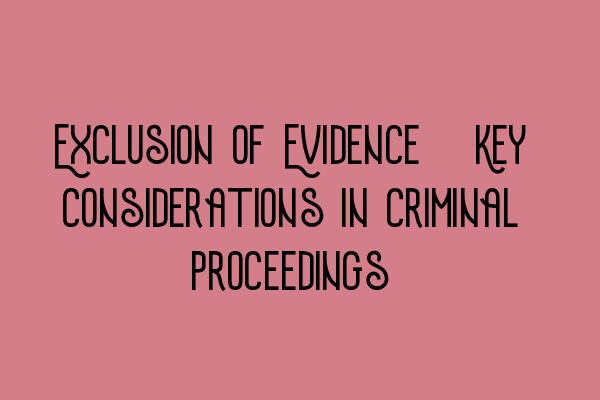Exclusion of Evidence: Key Considerations in Criminal Proceedings
Welcome to the SQE Criminal Law & Practice Blog! In this post, we will explore the crucial topic of exclusion of evidence in criminal proceedings. As a solicitor, it is essential to understand the key considerations surrounding this issue and how it can impact your cases.
The Importance of Excluding Evidence
Excluding evidence plays a significant role in criminal proceedings as it helps uphold the principles of fairness and justice. The exclusionary rule ensures that unlawfully obtained evidence or evidence that is unreliable is not admissible in court.
By excluding such evidence, the court safeguards the defendant’s rights and ensures that only reliable and legally obtained evidence is used to make a judgment.
Key Considerations for Exclusion of Evidence
When determining whether evidence should be excluded, several crucial factors must be considered:
1. Legality of Acquisition
The legality of acquiring evidence is a paramount consideration. If the evidence was obtained through illegal means, such as an unauthorized search or seizure, it is likely to be excluded from the proceedings. It is vital to carefully analyze the circumstances surrounding the acquisition of the evidence to determine its admissibility.
For further guidance on SQE 1 Practice Exam Questions, click here.
2. Reliability and Trustworthiness
Another crucial factor in excluding evidence is its reliability and trustworthiness. In criminal proceedings, the evidence must be credible and verifiable. If it is deemed to be unreliable, such as hearsay evidence or evidence obtained under duress, it may be excluded from consideration.
For comprehensive SQE 1 Preparation Courses, visit this link.
3. Impact on the Integrity of the Judicial Process
The exclusion of evidence may also be considered if allowing it would compromise the integrity of the judicial process. If admitting the evidence would lead to unfairness, prejudice, or a violation of the defendant’s rights, it is likely to be excluded.
If you need SQE 2 Preparation Courses to enhance your legal skills, check out this resource.
4. Public Interest Considerations
In certain cases, evidence may be excluded to protect the public interest. For example, if the evidence was obtained through an invasive covert operation that infringes on privacy rights, the court may decide to exclude it to maintain public confidence in the criminal justice system.
The Role of a Solicitor
As a solicitor, it is crucial to meticulously analyze the evidence in a criminal case and identify any grounds for exclusion. Your expertise in understanding the legal principles and precedents surrounding exclusion of evidence will enable you to develop persuasive arguments to protect your clients’ rights.
To help you prepare effectively for your SQE 1 exams, we offer SQE 1 Practice Mocks FLK1 FLK2 that simulate the exam environment and assess your knowledge and aptitude.
Conclusion
Excluding evidence is a crucial aspect of criminal proceedings, ensuring fairness and upholding the integrity of the judicial process. By carefully considering the legality, reliability, impact, and public interest aspects of the evidence, solicitors can effectively argue for the exclusion of evidence when necessary.
For more information on SRA SQE Exam Dates and other relevant resources, visit this page.
